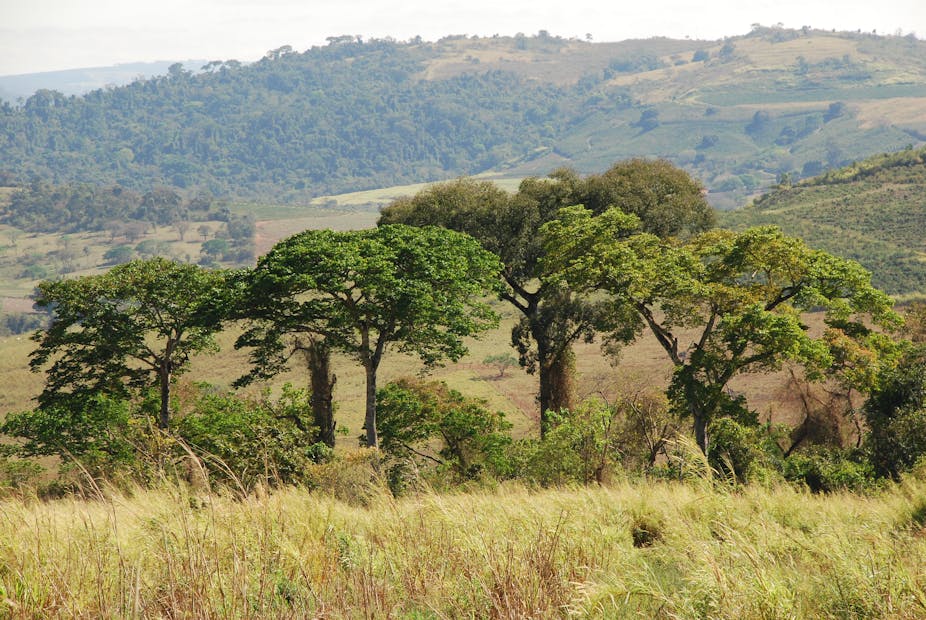Biofuels have come under scrutiny in the latest IPCC report, which outlines some of the emergent risks associated with their production.
In principle, biofuels seem to be an ideal solution to reducing carbon dioxide emissions and the risks of climate change. Most of the carbon released when the fuel is burned is absorbed by plants as they re-grow. If all went according to plan, the carbon cycle would be “closed” and there would be no (or very little) net release of carbon dioxide into the atmosphere from biofuels.
The Intergovernmental Panel on Climate Change’s latest report still finds potential for biofuels to provide a low(ish) carbon solution to energy needs and, as a result, be part of the arsenal of strategies to reduce the risks of climate change. But the authors also draw on the past decade of research that shows the challenges ahead if biofuels are to meet this promise without worsening other global problems.
But it has been clear from the earliest IPCC reports that biofuels were never going to be a game changer. At best they were going to provide 10% of the world’s energy needs – in part because it would be impossible to produce sufficient crops for biofuel, given the need to use land for other purposes.
Competing interests
As is common in policy debates, a solution is put forward to solve one particular problem (climate change) and over time people with interests in solving other problems (food or water security) begin to notice potential downsides for the focus of their concerns.
Biofuels have followed this traditional path and, since the last Assessment Report, it has been recognised that they cannot be understood as a solution outside of a more complex energy-food-water-climate nexus. They are interlinked in a way that land devoted to growing crops for biofuels might compete with food production, lead to deforestation and also compete for increasingly limited water supplies.
A significant hitch in the biofuel strategy was identified in what has become known as the Searchinger Report. This focused on the potential adverse effects of biofuels on climate change if a rush to growing them caused farmers to convert forests and grasslands to crops for fuel. Depending on the farming method used, biofuels could be responsible for significant land use problems, such as releasing other greenhouse gases like nitrogen oxides into the atmosphere.
Critiques followed, pointing out that crops might require significant amounts of water for irrigation in areas of the world already struggling with water scarcity. The assault on bioenergy continued with the food vs fuel debate, in which it was claimed that wholesale movement towards biofuel production could nudge aside food production, driving up food costs and worsening food shortages in the poorest nations.
Caution not abandon
The latest IPCC report has taken these concerns on board and issued a cautionary note. The message is not that biofuels should be abandoned. There is still scope for them to contribute to a global low carbon energy policy, but if done poorly, biofuels could worsen both food and water problems, while simultaneously making climate change worse.
Whether a risk emerges depends critically on what is assumed about how land would be used if crops for energy were not planted. These counterfactuals are where most of the disagreements lie regarding the net effect of biofuels.
Each of the concerns surrounding biofuel production has a solution to ensure that the risks identified don’t appear in practice. As the authors recognise, however, putting these solutions in place makes biofuels a more complicated mitigation strategy than was thought in the last assessment report.
Biofuel solutions
Advanced biofuel production is being developed to solve many of the existing problems with them. Solutions include moving away from a reliance on food crops, sustainable forestry practises where the total amount of carbon stored in plants remains constant even as biomass is harvested and the development of drought-resistant feedstock, perhaps through bioengineering.
The lesson? It was a mistake to ever view biofuels outside the energy-food-water-climate nexus. Human aims always collide and so a balance must be found and policies harmonised so each of the aims is represented in how land is used.
And watch this space, because the UK’s Supergen Bioenergy Hub at the University of Manchester, is addressing these issues and helping the world move toward solutions that will allow biofuels to play at least their limited role in solving the energy and climate change problems of tomorrow without worsening other pressing problems of food and water.

